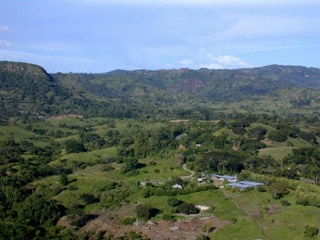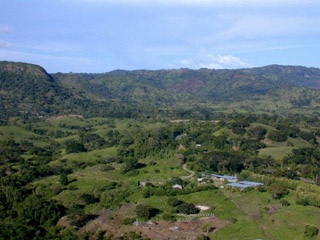 Proposed site of Pacific Rim’s El Dorado mine.In a truly David and Goliath battle, the people of El Salvador are fighting against a Canadian mining giant that was lawfully denied permits for a gold and silver mine that would devastate the local environment and threaten the health and livelihoods of native residents. Next week, the World Bank will decide if the mining giant can pursue its greedy demands for payment under an industry-friendly trade rule that would force El Salvador to pay a huge penalty for blocking the project.
Proposed site of Pacific Rim’s El Dorado mine.In a truly David and Goliath battle, the people of El Salvador are fighting against a Canadian mining giant that was lawfully denied permits for a gold and silver mine that would devastate the local environment and threaten the health and livelihoods of native residents. Next week, the World Bank will decide if the mining giant can pursue its greedy demands for payment under an industry-friendly trade rule that would force El Salvador to pay a huge penalty for blocking the project.
Vancouver-based Pacific Rim Mining Corp. has been exploring for gold and silver in the El Dorado region of El Salvador since 2002. That year, corporate gold diggers hit the jackpot when Dayton Mining discovered a gold and silver deposit at El Dorado, which lies 40 miles east of El Salvador’s capital city San Salvador. Pacific Rim immediately merged with Dayton Mining and forged ahead with further exploration drilling.
But the people of El Salvador soon rose up against this destructive project when word spread about its potential impact on local communities: water contamination from cyanide and other toxic mining chemicals, heavy industrial activity in an area sacred to native residents, and other red flags associated with allowing a foreign company to extract profits by exploiting the land and people of El Salvador.
In 2008, the El Salvadoran government refused to grant Pacific Rim permits to continue mining at El Dorado, after an intense campaign by regional authorities, church leaders, and local grassroots organizations like the National Coalition Against Metals Mining. The impacts of mining on local water sources and the health of locals had been apparent since exploration got under way, and the public no longer stayed silent about the risks of further exploitation of El Salvador’s resources.
Opposition to the mining project received a boost with the election of President Mauricio Funes, who vowed not to approve any such permits. Funes, who assumed office in June 2009, has said, “It’s very simple: my government will not authorize any extractive mining project.”
This was very bad news for mining companies who have filed permit applications on 25 projects seeking to extract 12 million ounces of gold and 78 million ounces of silver, a process that would require an estimated 22 million liters of water and 950 tons of cyanide. President Funes’ resolve sent a strong message that El Salvador is no longer interested in supporting the destruction of its own environment to benefit the bottom line of foreign corporations.
That stance was hardly pleasing to Pacific Rim, and the situation deteriorated into mayhem when three anti-mining activists were murdered between June and December 2009, allegedly at the behest of Pacific Rim managers. Local anti-mining activist Marcelo Rivera was apparently tortured prior to being killed. Ramiro Rivera, the vice president of the Environmental Committee of Cabanas, was assassinated in front of his daughter, along with Environmental Committee member Dora Alicia Sorto Recinos, who was eight months pregnant and carrying her 2-year-old child when she was struck down. President Funes has promised to investigate and “clear up” the gruesome murders.
While the murders remain unsolved officially, the stakes have risen higher in recent months. In a show of its dedication to screw the people of El Salvador, Pacific Rim Mining Corp. hired D.C.-based white-shoe law firm Crowell & Morring LLP to help file a lawsuit against the Republic of El Salvador seeking $700 million in compensation for lost investment, under provisions in the Central America Free Trade Agreement (CAFTA) with the U.S.
On May 31, in a World Bank courtroom in Washington D.C., Pacific Rim will unleash its lawyers to fight against the wishes of the people of El Salvador in search of a huge payout for “profit infringement.” The World Bank’s International Center for Settlement of Investment Disputes (ICSID) will decide whether to let Pacific Rim’s case move forward.
So-called “free trade” agreements like NAFTA and CAFTA provide protection for U.S. and Canadian extractive companies who seek to exploit the wealth buried beneath the soil of poorer Latin American countries. Despite the lofty rhetoric about the intentions behind these trade agreements, in practice these skewed mechanisms have hurt instead of helped El Salvador and other nations, whose control over local resource-management decisions has been hijacked by the World Bank.
Yesterday, May 27, was the International Day of Action Against Mining and Free Trade in El Salvador. Salvadorans and allies in this fight from around the world are standing up against corporate extortion, colonialism, and environmental destruction in Latin America.
Will the voice of the El Salvadoran people be heard in Washington? Or will the greed of Canadian mining company Pacific Rim Mining Corp. prevail yet again in the battle of extractive multinationals against the will of democratic society?



